The Italian version of Richard Fariña's Birmingham Sunday allows this website to reach 7,000 translations / commentaries.
Riccardo Venturi 2007/12/27 - 22:19
A Gift Come From The Law
Oh, Law, Law!
(Continues)
(Continues)
Contributed by Carles Viadel Mestre 2007/12/27 - 19:39
La licenza
Anonymous

Il testo è tratto dal canzoniere delle canzoni goliardiche
PORTANTINA
(Continues)
(Continues)
2007/12/27 - 19:05
Mississippi Goddam

(con alcuni interventi di Francesco Senia)
27 dicembre 2007
27 dicembre 2007
QUELL'INFETTO SCHIFO DEL MISSISSIPPI
(Continues)
(Continues)
2007/12/27 - 17:26
Is There Any Free Place?

Version française de Carles Viadel Mestre
EST-CE QU'IL Y A UNE PLACE LIBRE?
(Continues)
(Continues)
Contributed by Carles Viadel 2007/12/27 - 14:36
Qu'est-ce que nous ferons?
Un romance pendant les deux guerres mondiales et l'époque d'entre guerres.
Qu'est-ce que nous ferons?
(Continues)
(Continues)
Contributed by C.Viadel 2007/12/27 - 13:13
La figlia del Reggimento: Coro di soldati
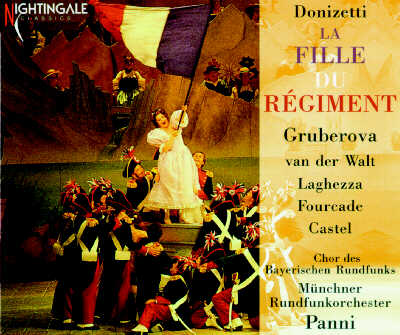
Da La Figlia del Reggimento / La Fille du Régiment
Opera comica in 2 atti di J.H.V. De Saint-Georges e J.-F. A. Bayard
Libretto italiano di Carlo Bassi
Musica di Gaetano Donizetti
Prima rappresentazione: Parigi, 1840
Atto I, 12
Opera comica in 2 atti di J.H.V. De Saint-Georges e J.-F. A. Bayard
Libretto italiano di Carlo Bassi
Musica di Gaetano Donizetti
Prima rappresentazione: Parigi, 1840
Atto I, 12
Permettetemi di dedicare questo momento della “Fille du régiment” di Gaetano Donizetti su libretto di Jules Vernoy de Saint-Georges e Jean-François Bayard al presidente del Consiglio Romano Prodi, che ha recentemente dichiarato di essere orgoglioso dei nostri soldati in missione in Libano.
Con una solenne dichiarazione: Caro Romano, hai avuto il mio voto nelle ultime lezioni (per forza, l’alternativa era la iena ridens!); ma non l’avrai mai più. Tanto, se rivince il buffone di Arcore, non cambia niente.
Con una solenne dichiarazione: Caro Romano, hai avuto il mio voto nelle ultime lezioni (per forza, l’alternativa era la iena ridens!); ma non l’avrai mai più. Tanto, se rivince il buffone di Arcore, non cambia niente.
Le Caporal; Soldats
(Continues)
(Continues)
Contributed by Renato Stecca 2007/12/27 - 11:05
Song Itineraries:
Anti-war classical music
Les collines de Rabiah

Ho scoperto in questa notte Santa questa magnifica canzone e me ne sono innamorato x l'intensità delle parole e per la musica che strazia il cuore. Ho rivolto il mio pensiero a tutte le vittime innocenti delle guerre e ho pianto lacrime di sangue, come da tempo non mi accadeva. Complimenti Adamo! By Marco
Marco Pestarino 2007/12/27 - 03:53
Huovi!

26 dicembre 2007
"In attesa di trovare un traduttore", c'era scritto nell'introduzione; poiché l'attesa è risultata vana per due anni, alla fine mi ci sono messo io a farla. Direi che il gioco valeva senz'altro la candela.
"In attesa di trovare un traduttore", c'era scritto nell'introduzione; poiché l'attesa è risultata vana per due anni, alla fine mi ci sono messo io a farla. Direi che il gioco valeva senz'altro la candela.
IL CAVALIERE IN ARMATURA
(Continues)
(Continues)
2007/12/26 - 17:08
Carry Greenham Home
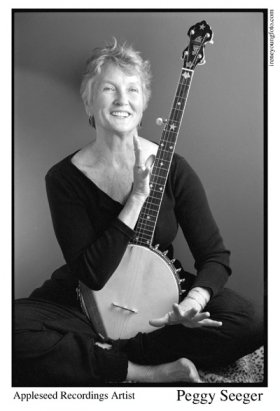
The Greenham Common Women's Peace Camp Songbook
Greenham Common Women's Peace Camp was a peace camp established to protest at nuclear weapon being sited at RAF Greenham Common in Berkshire, England. The camp began in September 1981 after a Welsh group called "Women for Life on Earth" arrived at Greenham to protest against the decision of the Government to allow cruise missiles to be based there.
On 1 April 1983, tens of thousands of protestors formed a 14 mile human chain from Greenham to the Aldermaston nuclear power station and the ordnance factory at Burghfield.
On 4 April 1984, the women were evicted from the Common by Newbury District Council. However by nightfall the women all returned to reform the camp.
The last missiles left the camp in 1991 but the camp remained in place until 2000 after protestors won the right to house a memorial on the site.
en.wikipedia
Il Campo della... (Continues)
Greenham Common Women's Peace Camp was a peace camp established to protest at nuclear weapon being sited at RAF Greenham Common in Berkshire, England. The camp began in September 1981 after a Welsh group called "Women for Life on Earth" arrived at Greenham to protest against the decision of the Government to allow cruise missiles to be based there.
On 1 April 1983, tens of thousands of protestors formed a 14 mile human chain from Greenham to the Aldermaston nuclear power station and the ordnance factory at Burghfield.
On 4 April 1984, the women were evicted from the Common by Newbury District Council. However by nightfall the women all returned to reform the camp.
The last missiles left the camp in 1991 but the camp remained in place until 2000 after protestors won the right to house a memorial on the site.
en.wikipedia
Il Campo della... (Continues)
Hand in hand, the line extends
(Continues)
(Continues)
Contributed by CCG/AWS Staff 2007/12/26 - 15:03
I Am A Witness To Your War Crimes
The Greenham Common Women's Peace Camp Songbook
Greenham Common Women's Peace Camp was a peace camp established to protest at nuclear weapon being sited at RAF Greenham Common in Berkshire, England. The camp began in September 1981 after a Welsh group called "Women for Life on Earth" arrived at Greenham to protest against the decision of the Government to allow cruise missiles to be based there.
On 1 April 1983, tens of thousands of protestors formed a 14 mile human chain from Greenham to the Aldermaston nuclear power station and the ordnance factory at Burghfield.
On 4 April 1984, the women were evicted from the Common by Newbury District Council. However by nightfall the women all returned to reform the camp.
The last missiles left the camp in 1991 but the camp remained in place until 2000 after protestors won the right to house a memorial on the site.
en.wikipedia
Il Campo della... (Continues)
Greenham Common Women's Peace Camp was a peace camp established to protest at nuclear weapon being sited at RAF Greenham Common in Berkshire, England. The camp began in September 1981 after a Welsh group called "Women for Life on Earth" arrived at Greenham to protest against the decision of the Government to allow cruise missiles to be based there.
On 1 April 1983, tens of thousands of protestors formed a 14 mile human chain from Greenham to the Aldermaston nuclear power station and the ordnance factory at Burghfield.
On 4 April 1984, the women were evicted from the Common by Newbury District Council. However by nightfall the women all returned to reform the camp.
The last missiles left the camp in 1991 but the camp remained in place until 2000 after protestors won the right to house a memorial on the site.
en.wikipedia
Il Campo della... (Continues)
I am a witness to your war crimes,
(Continues)
(Continues)
Contributed by CCG/AWS Staff 2007/12/26 - 14:44
Lies
The Greenham Common Women's Peace Camp Songbook
Greenham Common Women's Peace Camp was a peace camp established to protest at nuclear weapon being sited at RAF Greenham Common in Berkshire, England. The camp began in September 1981 after a Welsh group called "Women for Life on Earth" arrived at Greenham to protest against the decision of the Government to allow cruise missiles to be based there.
On 1 April 1983, tens of thousands of protestors formed a 14 mile human chain from Greenham to the Aldermaston nuclear power station and the ordnance factory at Burghfield.
On 4 April 1984, the women were evicted from the Common by Newbury District Council. However by nightfall the women all returned to reform the camp.
The last missiles left the camp in 1991 but the camp remained in place until 2000 after protestors won the right to house a memorial on the site.
en.wikipedia
Il Campo della... (Continues)
Greenham Common Women's Peace Camp was a peace camp established to protest at nuclear weapon being sited at RAF Greenham Common in Berkshire, England. The camp began in September 1981 after a Welsh group called "Women for Life on Earth" arrived at Greenham to protest against the decision of the Government to allow cruise missiles to be based there.
On 1 April 1983, tens of thousands of protestors formed a 14 mile human chain from Greenham to the Aldermaston nuclear power station and the ordnance factory at Burghfield.
On 4 April 1984, the women were evicted from the Common by Newbury District Council. However by nightfall the women all returned to reform the camp.
The last missiles left the camp in 1991 but the camp remained in place until 2000 after protestors won the right to house a memorial on the site.
en.wikipedia
Il Campo della... (Continues)
Nuclear is a safe kind of energy
(Continues)
(Continues)
Contributed by CCG/AWS Staff 2007/12/26 - 14:40
Under the Full Moonlight We Dance [Full Moonlight Dance]
![Under the Full Moonlight We Dance [Full Moonlight Dance]](img/upl/gh17-2.jpg)
The Greenham Common Women's Peace Camp Songbook
Greenham Common Women's Peace Camp was a peace camp established to protest at nuclear weapon being sited at RAF Greenham Common in Berkshire, England. The camp began in September 1981 after a Welsh group called "Women for Life on Earth" arrived at Greenham to protest against the decision of the Government to allow cruise missiles to be based there.
On 1 April 1983, tens of thousands of protestors formed a 14 mile human chain from Greenham to the Aldermaston nuclear power station and the ordnance factory at Burghfield.
On 4 April 1984, the women were evicted from the Common by Newbury District Council. However by nightfall the women all returned to reform the camp.
The last missiles left the camp in 1991 but the camp remained in place until 2000 after protestors won the right to house a memorial on the site.
en.wikipedia
Il Campo della... (Continues)
Greenham Common Women's Peace Camp was a peace camp established to protest at nuclear weapon being sited at RAF Greenham Common in Berkshire, England. The camp began in September 1981 after a Welsh group called "Women for Life on Earth" arrived at Greenham to protest against the decision of the Government to allow cruise missiles to be based there.
On 1 April 1983, tens of thousands of protestors formed a 14 mile human chain from Greenham to the Aldermaston nuclear power station and the ordnance factory at Burghfield.
On 4 April 1984, the women were evicted from the Common by Newbury District Council. However by nightfall the women all returned to reform the camp.
The last missiles left the camp in 1991 but the camp remained in place until 2000 after protestors won the right to house a memorial on the site.
en.wikipedia
Il Campo della... (Continues)
Under the full moonlight we dance
(Continues)
(Continues)
Contributed by CCG/AWS Staff 2007/12/26 - 14:35
Se questo è un uomo
La versione in lingua ebraica della prima parte del testo, da questa pagina. Una versione completa sarà preparata in seguito.

הזהו אדם?
(Continues)
(Continues)
Contributed by Riccardo Venturi 2007/12/26 - 02:54
Il povero Elia

[1962]
Testo e musica di Fausto Amodei
Lyrics and music by Fausto Amodei
Testo ripresto da: Cantacronache, Un'avventura politico-musicale degli anni cinquanta, a cura di Emilio Jona e Michele L. Straniero, Crel-Scriptorium 1995, p. 117.
Testo e musica di Fausto Amodei
Lyrics and music by Fausto Amodei
Testo ripresto da: Cantacronache, Un'avventura politico-musicale degli anni cinquanta, a cura di Emilio Jona e Michele L. Straniero, Crel-Scriptorium 1995, p. 117.
Lo chiamavano il povero Elia
(Continues)
(Continues)
Contributed by adriana 2007/12/25 - 09:41
Song Itineraries:
Death penalty: murder by the power, Deserters
Where Have all the Flowers Gone

Greetings from Czech Republic.
Oh my god! I love this song so much. It is the first song I learned by heart (I mean, not the czech version:D) I love how Dalida, Marlene Dietrich and Judita Čeřovská sungs it. May they rest in peace. Bye and thank you.)
Oh my god! I love this song so much. It is the first song I learned by heart (I mean, not the czech version:D) I love how Dalida, Marlene Dietrich and Judita Čeřovská sungs it. May they rest in peace. Bye and thank you.)
Johny 2007/12/25 - 02:28
Volver a los diecisiete

To stih-dekinsebnyŭtig R.V. hē adgeveian kanūr nă săn gvī ad to kălart in nāg nă nahodlāig nă 2007 n.
ĀRGĪSTĀI LA DEKINSEB NYŬT
(Continues)
(Continues)
2007/12/25 - 00:53
Volver a los diecisiete
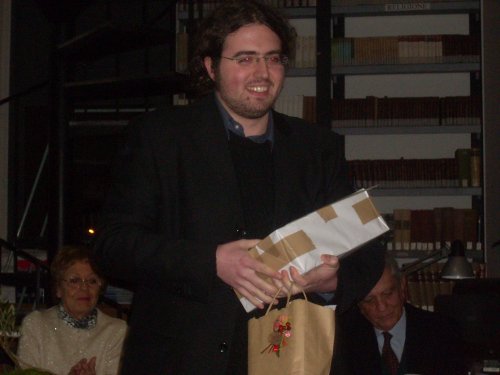
Esperantigis pli-malpli deksepjarulo Nicola Ruggiero, administranto de tiu ĉi retejo
24 dicembre 2007
24 dicembre 2007
REIĜI DEKSEPJARA
(Continues)
(Continues)
Contributed by CCG/AWS Staff 2007/12/24 - 21:51
99 Luftballons

è una canzone meravigliosa e se si capisce il vero significato del testo, non si può dire che fa schifo...anzi
Valentina 2007/12/24 - 21:46
Il libro

[1983]
Testo e musica di Angelo Branduardi
Album: Cercando L’Oro
Canzone contro la guerra di forte impatto, si apre con gli imponenti violini che ci spingono ad aprire un libro e girarne le pagine per veder venir fuori bimbi, cavalli, mele e giardini, ma anche nuovole nere e guerra...
Straordinario il video-cartone del compianto Lele Luzzati.
Testo e musica di Angelo Branduardi
Album: Cercando L’Oro
Canzone contro la guerra di forte impatto, si apre con gli imponenti violini che ci spingono ad aprire un libro e girarne le pagine per veder venir fuori bimbi, cavalli, mele e giardini, ma anche nuovole nere e guerra...
Straordinario il video-cartone del compianto Lele Luzzati.
Apri il libro, gira il foglio,
(Continues)
(Continues)
Contributed by Grampasso 2007/12/24 - 21:32
V hospodě na rynku

iniziata nel mese di aprile del 2007
terminata tra il 23 e il 24 dicembre 2007
terminata tra il 23 e il 24 dicembre 2007
La mia conoscenza della lingua ceca non è eccelsa. Per avere una traduzione da questa lingua devo penare, controllare e ricontrollare ogni parola. Ma alla fine, qualcosa ne viene fuori; e quel che ne viene fuori è questa canzone che sembra riprodurre, con un finale più amaro, la vicenda di un altro "soldato per caso", il buon soldato Sc'vèik di Jaroslav Hašek. Non si nasce negli stessi posti a caso, verrebbe da dire.
Vorrei dedicare questa traduzione all'amico e compagno Alessio Lega, che si è occupato recentemente di Jarek Nohavica (e di Karel Kryl) in una puntata della sua rubrica "...E compagnia cantante" pubblicata su A-Rivista Anarchica. Magari, chissà, forse un giorno il buon Lega, nella sua bella rubrica, riuscirà anche a dir mezza parolina su questo sito, che pure lo ospita (doverosamente e con piacere) in gran copia. Ci contenteremmo di pochino, anche un semplice "ciao"; ma comunque, pazienza. Vorrà dire che il saluto glielo facciamo noi.
Vorrei dedicare questa traduzione all'amico e compagno Alessio Lega, che si è occupato recentemente di Jarek Nohavica (e di Karel Kryl) in una puntata della sua rubrica "...E compagnia cantante" pubblicata su A-Rivista Anarchica. Magari, chissà, forse un giorno il buon Lega, nella sua bella rubrica, riuscirà anche a dir mezza parolina su questo sito, che pure lo ospita (doverosamente e con piacere) in gran copia. Ci contenteremmo di pochino, anche un semplice "ciao"; ma comunque, pazienza. Vorrà dire che il saluto glielo facciamo noi.
ALL’OSTERIA IN PIAZZA
(Continues)
(Continues)
2007/12/24 - 21:30
Brigante se more
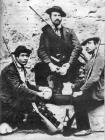
… ma quale importanza può avere se il pezzo sia stato scritto o soltanto rielaborato da Eugenio Bennato e Carlo d’Angiò?
Secondo il mio modesto parere non ha importanza se tra il presunto testo originale (allora esiste una ballata originale dell’epoca?) e quello di Bennato vi siano alcune differenze marginali: se si combatte per il re borbone o ce ne freghiamo del re, la sostanza è che “ 'a terrə è 'a noštrə e nun s'à dda ttuccà”; la preghiera e la bestemmia non sono forse le due facce della stessa medaglia al pari dell’amore e dell’odio?
Trascuriamo invece quello che secondo me rappresenta un aspetto fondamentale della lotta: la partecipazione attiva delle donne, che condividono in tutto e per tutto il destino dei loro uomini:
Fèmmenə bellə ca ratə lu corə,
si llu brigantə vulitə salvà
nun 'o cercatə, scurdatev'o nomə;
Mi sovviene in proposito la scena del film di Nanni Loy “Le... (Continues)
Secondo il mio modesto parere non ha importanza se tra il presunto testo originale (allora esiste una ballata originale dell’epoca?) e quello di Bennato vi siano alcune differenze marginali: se si combatte per il re borbone o ce ne freghiamo del re, la sostanza è che “ 'a terrə è 'a noštrə e nun s'à dda ttuccà”; la preghiera e la bestemmia non sono forse le due facce della stessa medaglia al pari dell’amore e dell’odio?
Trascuriamo invece quello che secondo me rappresenta un aspetto fondamentale della lotta: la partecipazione attiva delle donne, che condividono in tutto e per tutto il destino dei loro uomini:
Fèmmenə bellə ca ratə lu corə,
si llu brigantə vulitə salvà
nun 'o cercatə, scurdatev'o nomə;
Mi sovviene in proposito la scena del film di Nanni Loy “Le... (Continues)
Crescenz 2007/12/24 - 15:42
Wake Me Up When September Ends

... green day siete i mejo!!!!!!!!!! poi la canzone wake me up when september ends è bellissima ankora adesso se l'ascolto mi viene da piangere... Billie tu 6 il mijore in axoluto nn c'è nessino + bravo di te!!!!!!!!!!! tutte le canzoni k hai scritto sn bellissime ma la mia preferita è jesus of suburbia!!!!!! ... BILLIE, MIKE, TRé SIETE BRAVISSIMI!!!!!!!!!!!!!!!
2007/12/24 - 14:46
We Work For The Russians
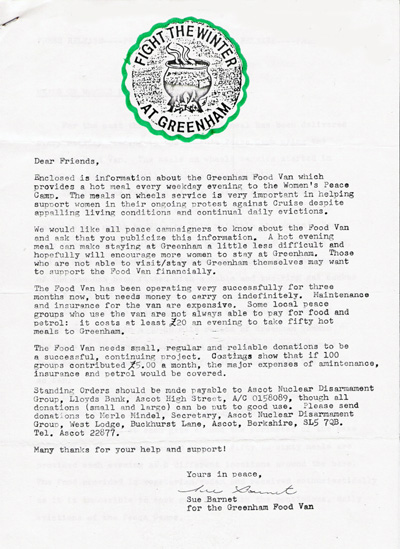
The Greenham Common Women's Peace Camp Songbook
Greenham Common Women's Peace Camp was a peace camp established to protest at nuclear weapon being sited at RAF Greenham Common in Berkshire, England. The camp began in September 1981 after a Welsh group called "Women for Life on Earth" arrived at Greenham to protest against the decision of the Government to allow cruise missiles to be based there.
On 1 April 1983, tens of thousands of protestors formed a 14 mile human chain from Greenham to the Aldermaston nuclear power station and the ordnance factory at Burghfield.
On 4 April 1984, the women were evicted from the Common by Newbury District Council. However by nightfall the women all returned to reform the camp.
The last missiles left the camp in 1991 but the camp remained in place until 2000 after protestors won the right to house a memorial on the site.
en.wikipedia
Il Campo della... (Continues)
Greenham Common Women's Peace Camp was a peace camp established to protest at nuclear weapon being sited at RAF Greenham Common in Berkshire, England. The camp began in September 1981 after a Welsh group called "Women for Life on Earth" arrived at Greenham to protest against the decision of the Government to allow cruise missiles to be based there.
On 1 April 1983, tens of thousands of protestors formed a 14 mile human chain from Greenham to the Aldermaston nuclear power station and the ordnance factory at Burghfield.
On 4 April 1984, the women were evicted from the Common by Newbury District Council. However by nightfall the women all returned to reform the camp.
The last missiles left the camp in 1991 but the camp remained in place until 2000 after protestors won the right to house a memorial on the site.
en.wikipedia
Il Campo della... (Continues)
We Work For The Russians
(Continues)
(Continues)
Contributed by CCG/AWS Staff 2007/12/24 - 13:55
Los Desaparecidos (The Disappeared Ones)

I DESAPARECIDOS (GLI SCOMPARSI)
(Continues)
(Continues)
Contributed by Kiocciolina 2007/12/24 - 05:51
×
![]()

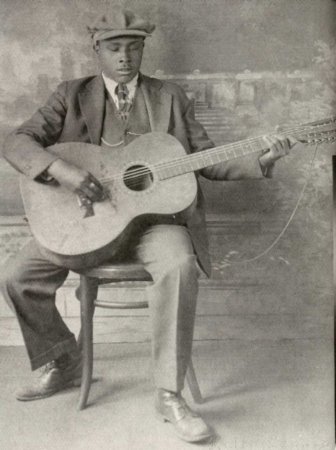
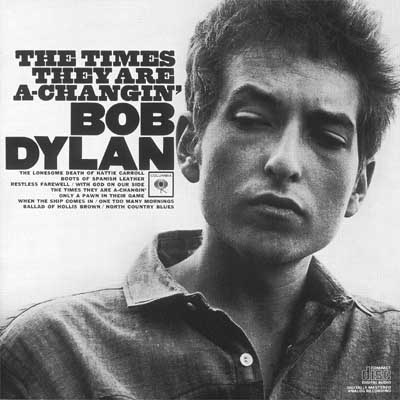
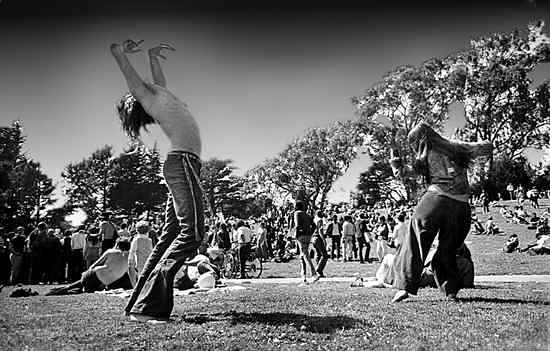
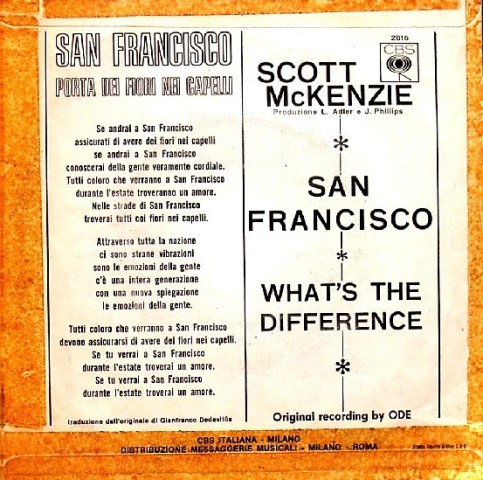



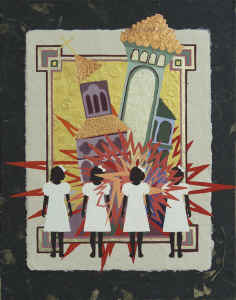
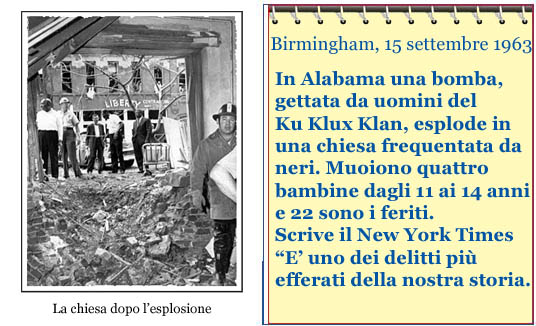
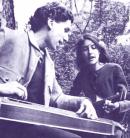
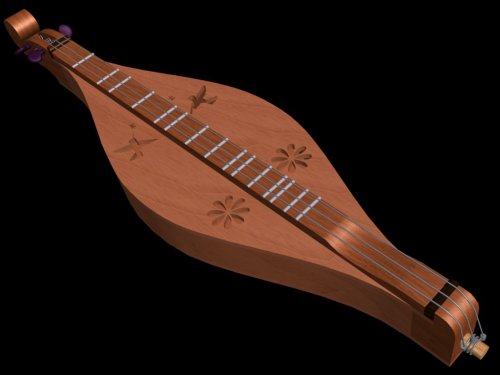





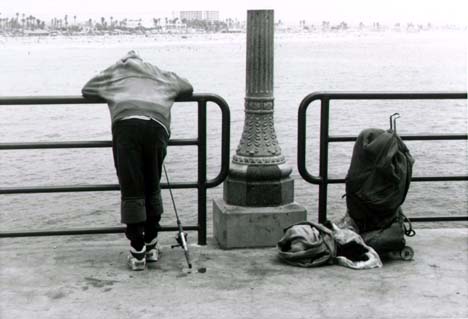
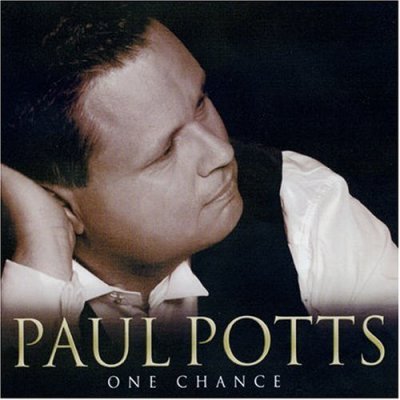



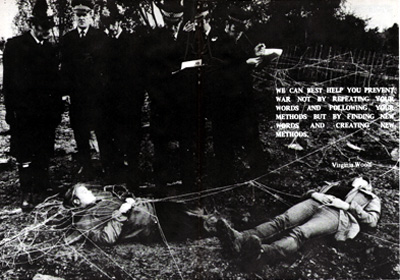


Lyrics and Music by Bob Dylan
Testo e musica di Bob Dylan
The Bootleg Series Volumes 1-3 [1991]
"Blind Willie McTell" is a song by Bob Dylan, titled after the blues singer Blind Willie McTell. It was recorded in 1983 but left off Dylan's album Infidels and officially released in 1991 on the The Bootleg Series Volumes 1-3 (Rare & Unreleased) 1961-1991. The melody is loosely based on "St. James Infirmary Blues". For the song, Dylan, seated at the piano and accompanied by Mark Knopfler on the acoustic guitar, sings a series of plaintive, heartbreaking verses depicting allegorical scenes which reflect on the history of American music and slavery. Each verse ends with the same negative refrain: "Nobody can sing the blues like Blind Willie McTell."
Following three albums with overt Christian themes, Infidels struck most major rock critics (perhaps erroneously)... (Continues)